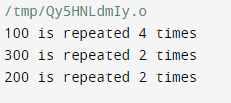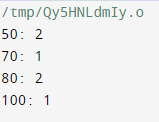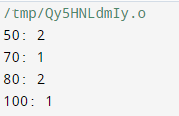Counting Frequencies of Array Elements in C++
We have an array of integer items with duplicate values, and our objective is to compute the frequencies of the different elements in the array.
Methods:
Methods that can be used to find out the frequencies of elements in an array in the C++ programming language.
Method 1: Naive technique (approach) with the extra-space method
Method 2: Naive technique (approach) without the extra-space method
Method 3: Using the sorting method
Method 4: Using the hash map method
1. Naive technique with the extra-space method
In this technique, using two "for" loops, we can count the frequency of every element.
- Create an array of size "n" in order to see the status of the visited elements.
- From index zero to n, execute a loop. If "visited[i] == 1," then that element is skipped.
- Otherwise, make a "var count = 1" to retain the frequency count.
- Execute a loop from the index "i+1" to "n."
- If "arry[i] == arry[j]," then the count is increased by one and "visited[j]" is set to one.
- After the "for" loop has finished iterating, print the element along with the count value.
Example
#include <bits/stdc++.h>
using namespace std;
/* To run the program, use the main() function. */
int main()
{
int arry[] = {100, 300, 100, 200, 100, 200, 300, 100};
int n = sizeof(arry)/sizeof(arry[0]);
int visit[n];
for(int i=0; i<n; i++)
{
if(visit[i]!=1)
{
int count = 1;
for(int j=i+1; j<n; j++)
{
if(arry[i]==arry[j])
{
count++;
visit[j]=1;
}
}
cout<<arry[i]<<" is repeated "<<count<<" times "<<endl;
}
}
return 0;
}
Output:

Space Complexity and Time Complexity:
- Space Complexity: O(n)
- Time Complexity: O(n2)
2. Naive technique without the extra-space method
We will use the naive technique in this method to get the frequency of the elements in the supplied integer array without requiring any extra space.
Example
#include <bits/stdc++.h>
using namespace std;
void count_Frequency(int *arry, int size)
{
for (int i = 0; i < size; i++)
{
int flag = 0;
int count = 0;
/* Any element's counting must be pushed to its most recent occurrence */
for (int j = i+1; j < size; j++)
{
if (arry[i] == arry[j])
{
flag = 1;
break;
}
}
/* The term "continue" is used to break the current iteration and proceeds to the following iteration in a "for" loop or a "while" loop */
if (flag == 1)
continue;
for(int j = 0;j<=i;j++)
{
if(arry[i] == arry[j])
count +=1;
}
cout << arry[i] << ": " << count << endl;
}
}
int main()
{
int arry[] = {50, 80, 50, 70, 80, 100};
int size = sizeof(arry)/sizeof(arry[0]);
count_Frequency(arry, size);
return 0;
}
Output:

Space Complexity and Time Complexity:
- Space Complexity: O(1)
- Time Complexity: O(n2)
3. Using the Sorting method
In this technique, we will sort the array and then count the frequency of the items.
Example
#include<bits/stdc++.h>
using namespace std;
void count_Distinct(int arry[], int n)
{
sort(arry, arry + n);
// Traverse the sorted array
for (int i = 0; i < n; i++)
{
int count = 1;
/* When you come across duplicates, advance the index */
while (i < n - 1 && arry[i] == arry[i + 1])
{
i++;
count++;
}
cout << arry[i] << ": " << count << endl;
}
}
/* Driver program for testing the above-mentioned function */
int main()
{
int arry[] = {50, 80, 50, 70, 80, 100};
int n = sizeof(arry) / sizeof(arry[0]);
count_Distinct(arry, n);
return 0;
}
Output:

Space Complexity and Time Complexity:
- Space Complexity: O(1)
- Time Complexity: O(nlogn)
4. Using the hash map method
In this technique, the frequency of the items will be stored using a hash-map approach.
- Create an "unordered_map" with the name "ump."
- Use a loop ("for" or "while") to iterate over the array.
- Set “ump[arry[i]]++”
- After finishing the iteration, execute a loop across map.
- Also, print the key-value pair.
Example
#include <bits/stdc++.h>
using namespace std;
void count_Freq(int arry[], int n)
{
unordered_map<int, int> ump;
/* Count frequencies as you traverse the array elements */
for (int i = 0; i < n; i++)
{
ump[arry[i]]++;
}
// Traverse through map and print frequencies
for (auto x : ump)
{
cout << x.first << " occurs " << x.second << endl;
}
}
int main()
{
int arry[] = { 101, 201, 201, 101, 101, 201, 51, 201 };
int n = sizeof(arry) / sizeof(arry[0]);
count_Freq(arry, n);
return 0;
}
Output:
